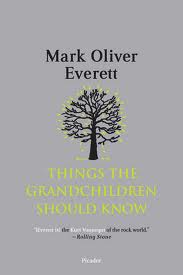
Eels‘ music, dark yet somehow optimistic, aids us in the construction of the character of its singer. Having heard some rumours about the deaths surrounding him and about his scientific father (the brain behind the Many-Worlds thesis), the portrait gets even clearer. Thus, when in the fifth line of the book, Everett states: “I was sure I’d never live to the age of eighteen so I never bothered making any plans for the future” (1) we are not surprised at all but reaffirmed in our thoughts. A beginning that brings with it a disenchantment mood a la Holden Caulfield. Not a bad beginning.
“I could transcend the shitty situations around me and even turn them into something positive just by setting them to music.” (6)
After giving the embellished version of Mary’s breakup story, and even a more embellished one still, E gives us the straightforward version to conclude: “I don’t want to waste your time with the flowery shit, so, out of respect for you, gentle reader, I’m going to stick with the direct approach.” (9) And Salinger’s hero comes back to mind because it is impossible not to remember the first sentences of The Catcher in the Rye: “If you really want to hear about it, the first thing you’ll probably want to know is where I was born, and what my lousy childhood was like, and how my parents were occupied and all before they had me, and all that David Copperfield kind of crap, but I don’t feel like going into it, if you want to know the truth.”
“My father was so uncommunicative that I thought of him the same way I thought of the furniture. It was just there.” (17)
“I was driving down the road and heard the English group Portishead on the radio for the first time and it stopped me cold. I had to pull the truck over to the side of the road so I could really listen.” (105-6) When Dummy was released, everything changed indeed. and Glory Box had (still has) the power to make me stop whatever I was doing to listen to it attentively. Time after time.
“She just wasn’t equipped to survive in this world” (120) says E after her sister’s suicide which later on became the song Elizabeth on the bathroom floor. From this point on, after we have learnt about E‘s odd and awkward boyhood and teen years, the music becomes much more important and it is really interesting to see how the songs became to be, how his own biography is translated into music and lyrics. But it is also interesting to see the hypocrisy of the music companies, the pressure upon the bands to do only what sells the most regardless of its quality. The shameful censorship still existing in the USA where TV and Radio programmes (on the other hand perfectly full of unnecessary violence), that forbade E to use the word “goddamn” on air. “The CBS censors will allow the word “God” and the word “damn” to be used separately, but never together.” (171) Quite difficult, then, to succeed with a single namedGoddamn right it’s a beautiful day!
And against all odds, all the producers who turned their back to him, E‘s music keeps on growing and being awarded. Not that he is extremely happy about the merits: “I hated going to things like film premieres or award shows, finding that they brought out the worst side of humanity.” (185)
“We’re all fucked up, I’m thinking, and that’s the truth. Everyone’s got some crazy shit going on in their life and no one is living any of that fairy-tale shit that the TV made you believe life was supposed to be like when you were young.” (234)
But, despite everything, we must keep on going. That is the main message behind the book. Life may not be great, nor easy or pleasant, but it is what we have. So let’s try to make the most out of it.
No comments:
Post a Comment